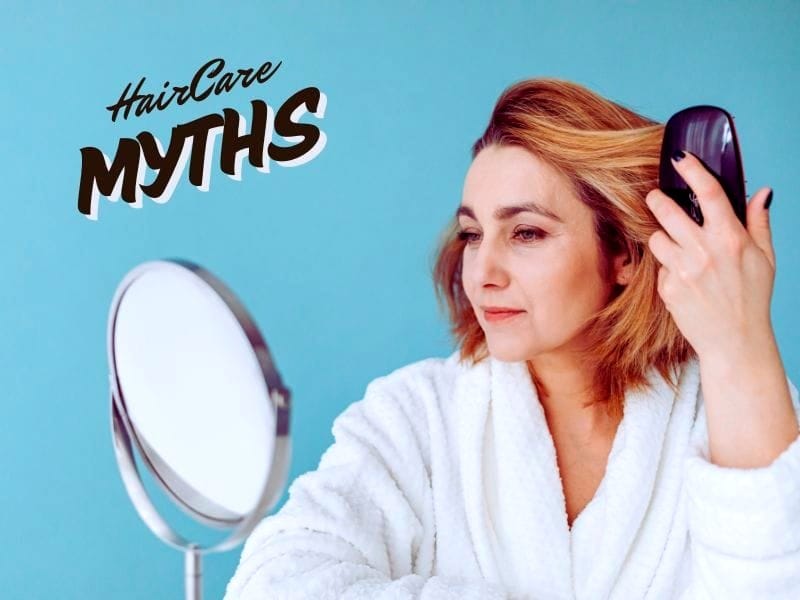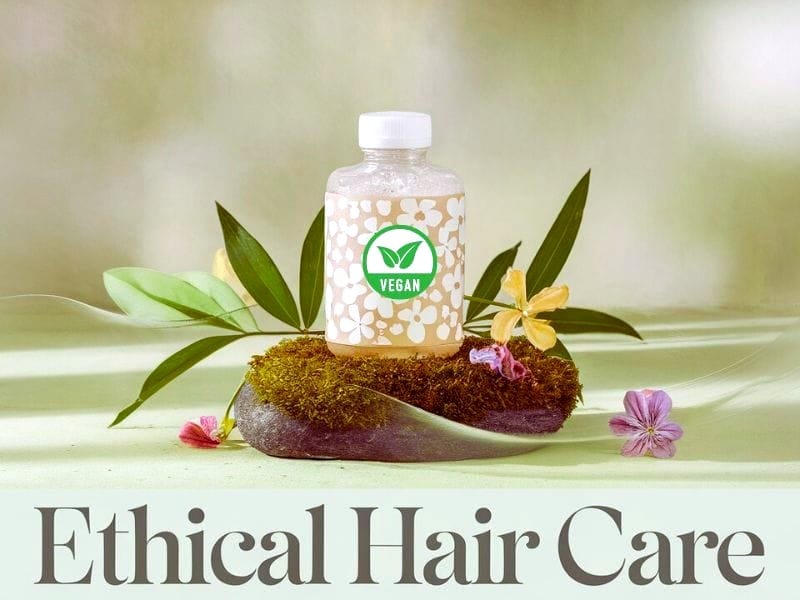Many clients believe common haircare myths that can lead to damage and disappointment. As a salon owner, correcting these misconceptions builds trust and sets you apart as an expert. This guide breaks down 10 popular hair myths and gives you the facts to educate your clients with confidence.
Introduction
Misinformation spreads fast in the beauty industry, and haircare is no exception. Many clients come into salons with preconceived notions about how to take care of their hair, often influenced by outdated advice, social media trends, and marketing gimmicks. Unfortunately, these haircare myths can lead to unnecessary damage, breakage, and frustration for both clients and stylists. As a salon owner, it’s crucial to educate your clients on what truly works and what doesn’t.

By correcting common haircare myths, you not only improve the health of your clients' hair but also strengthen trust in your expertise. Clients rely on professionals to guide them toward better hair health, and debunking misinformation is a big part of that responsibility. Whether it's the belief that frequent trims make hair grow faster or that expensive products always work better, setting the record straight will position your salon as a leader in hair education. Let’s break down the top myths and the real facts behind them.
Why Haircare Myths Are Hurting Your Clients and Your Business
Many clients unknowingly damage their hair by following incorrect advice passed down through generations or picked up online. For example, myths about daily washing, aggressive brushing, and product overuse can lead to long-term hair health issues. When clients experience breakage or excessive shedding due to these misconceptions, they may blame their stylists or feel frustrated with their results. By proactively addressing these myths, salons can prevent common hair problems and improve client satisfaction.
Salons that educate their clients stand out in a competitive industry. Misinformation leads to unrealistic expectations, and when clients don’t see the results they expect, they may turn to another salon. By debunking these myths and providing fact-based haircare routines, you build trust, loyalty, and credibility. The more informed your clients are, the more likely they are to return for services and invest in the right products.
Haircare Myths That Need to Be Debunked Immediately
Let’s dive into the most common myths your clients may believe—and how to set the record straight.

- Shaving/Cutting Hair Makes It Grow Thicker and Faster – Trimming hair removes split ends but doesn't affect the growth rate or thickness. Hair appears thicker because the blunt ends make it seem fuller.
- You Should Shampoo Your Hair Every Day/Once a Week – There’s no universal rule. Wash your hair when it feels oily, dirty, or itchy. Overwashing can strip natural oils, while not washing enough can cause buildup.
- Brushing Your Hair 100 Times Will Make It Shinier – While brushing helps distribute natural oils, excessive brushing can cause breakage. A few strokes with the right brush are enough.
- If You Pluck a Grey Hair, Three More Will Grow in Its Place – Only one hair grows per follicle. Plucking may damage the follicle, but it won’t cause multiple hairs to grow.
- Male Hair Loss is Inherited from the Mother – Hair loss is influenced by multiple genetic and environmental factors, not just the maternal side.
- Dandruff is caused by a Dry Scalp – Dandruff is often caused by an overgrowth of yeast, not dryness. A dry scalp can exist without dandruff, and vice versa.
- Split Ends Can Be Repaired – No product can permanently fix split ends. The only way to get rid of them is by trimming the hair.
- Oily Hair Doesn’t Need Conditioner – Skipping conditioner can make your scalp produce more oil to compensate. Lightweight conditioners can help maintain balance.
- You Don’t Need Heat Protection for Your Hair – Heat styling tools can cause serious damage. Heat protectants create a barrier to reduce moisture loss and breakage.
- Coloring is Bad for Your Hair – Not all hair dyes are damaging. Ammonia-free dyes and proper aftercare can keep colored hair healthy.
How Vegan Haircare Helps Dispel Haircare Myths
Vegan haircare is an excellent alternative to traditional products, offering plant-based solutions that nourish hair without harmful chemicals. Many conventional hair products contain sulfates, silicones, and parabens that contribute to dryness and scalp irritation. Vegan formulas replace these harsh ingredients with natural oils, botanical extracts, and essential nutrients that promote long-term hair health.
Clients often believe that only salon-exclusive brands can provide professional results, but high-quality vegan products deliver exceptional performance. By introducing plant-based alternatives, salons can provide ethical, effective solutions that align with modern haircare trends. Vegan products cater to clients seeking clean beauty options while improving overall hair and scalp health.
How Plant-Based Ingredients Provide Long-Term Hair Benefits

Plant-based ingredients offer long-term hair benefits by nourishing strands with essential vitamins and minerals. Natural oils like coconut and argan deeply moisturize, reducing dryness and breakage. Herbal extracts such as aloe vera and green tea soothe the scalp, promoting healthy hair growth. Unlike synthetic chemicals, these ingredients are gentle and less likely to irritate.
Over time, plant-based products help strengthen hair from the roots, making it more resilient. Antioxidants in botanical extracts protect against environmental damage and premature aging. Many plant-derived proteins repair and fortify hair structure, improving texture and shine. Consistently using these ingredients leads to healthier, shinier, and more manageable hair.
How to Educate Clients on the Truth About Haircare Myths
Correcting misinformation starts with clear communication. Salons should take the time to educate clients during consultations and services. Whether it’s explaining the benefits of sulfate-free shampoos or demonstrating proper heat protection, these small moments build trust.
Utilizing social media, blogs, and in-salon signage can reinforce these lessons. Sharing before-and-after transformations or testimonials from clients who’ve improved their hair health helps debunk common myths. The more informed clients are, the more likely they are to follow professional advice and achieve long-term results.
The Role of Salon Professionals in Correcting Misinformation

Salon professionals play a key role in correcting haircare misinformation by educating clients with accurate knowledge. Many customers believe common myths, like trimming makes hair grow faster or drugstore shampoos work just as well as salon-quality products. By addressing these misconceptions, stylists help clients make informed choices for healthier hair. Clear, professional advice builds trust and enhances the salon’s reputation.
Social media and word-of-mouth spread misinformation quickly, making expert guidance even more important. Salon professionals can use consultations, workshops, and content creation to share science-backed haircare facts. Demonstrating the right techniques and recommending quality products empower clients to maintain strong, beautiful hair. By staying informed, stylists position themselves as trusted experts in the industry.
Why Addressing Haircare Myths Helps Your Salon Stand Out
Addressing haircare myths helps your salon stand out by positioning you as a trusted expert in the industry. Clients often hear misinformation about haircare, from DIY treatments to product misconceptions. When you educate them with accurate, science-backed advice, they see your salon as a reliable source of truth. This builds stronger client relationships and increases loyalty.
Correcting myths also sets your salon apart from competitors who may not prioritize education. You show that your services go beyond styling by sharing knowledge through consultations, social media, and in-salon discussions. Clients appreciate salons that care about their hair’s long-term health, leading to more referrals and a stronger reputation.
The Best Ways to Introduce Clients to Correct Haircare Practices

Educating clients on proper haircare starts with personalized consultations. Take the time to assess their hair type, lifestyle, and concerns before recommending products and routines. Use simple explanations to debunk common myths and suggest professional solutions. When clients understand why certain practices work, they’re more likely to trust and follow your advice.
Another effective approach is demonstrating techniques during appointments. Show clients how to properly shampoo, condition, and style their hair using the right tools. Offering printed or digital aftercare guides reinforces what they’ve learned. You can also share tips through social media or email newsletters to keep them engaged. When clients see results, they’ll appreciate your expertise and remain loyal to your salon.
Building Trust Through Transparent Haircare Education
Clients value honesty, especially when it comes to their hair. By providing clear, fact-based haircare education, you establish yourself as a trustworthy expert. Be upfront about what products can and can’t do, and explain why certain treatments work better than others. When clients see that you prioritize their hair health over sales, they’ll feel confident in your recommendations.
Transparency also means correcting misinformation with kindness. If a client believes a haircare myth, take the time to educate rather than dismiss it. Use real examples, product knowledge, and scientific explanations to guide them toward better choices. When clients trust your expertise, they’re more likely to return, refer others, and invest in your salon’s services.
FAQs About Haircare Myths
What’s the biggest haircare myth that most clients believe?
The idea that trimming hair makes it grow faster is one of the most common misconceptions. While trims prevent breakage, they don’t affect the actual growth process.
Do salon-quality products make a difference in hair health?
Yes! Professional hair products are formulated with high-quality ingredients that penetrate deeper, nourish hair effectively, and deliver better long-term results than drugstore alternatives.
Can switching to vegan haircare products improve hair texture?
Absolutely! Vegan products contain natural, plant-based ingredients that nourish the scalp and hair without harsh chemicals, improving overall texture and manageability.
Does hair type determine how often you should wash your hair?
Yes. Fine hair tends to get oily faster and may require more frequent washing, while curly or coarse hair benefits from less frequent washes to retain moisture.
What’s the best way for salons to educate clients on proper hair care?
Providing in-depth consultations, offering educational content on social media, and demonstrating proper haircare techniques during appointments are all effective methods.
Final Thoughts
Misinformation in haircare doesn’t just hurt your clients—it can impact your salon’s reputation, too. By addressing myths with expert knowledge and the right products, you position your salon as a trusted authority. Clients will return not just for services but for the confidence you provide in their hair’s long-term health.
💡 Ready to set your salon apart? Sign up now for exclusive insights, top-tier product recommendations, and tips to elevate your services. Message us today and start transforming your salon into the go-to destination for healthy, informed haircare! 🚀
Learn the most common hair care mistakes and how to educate your clients in this video.

